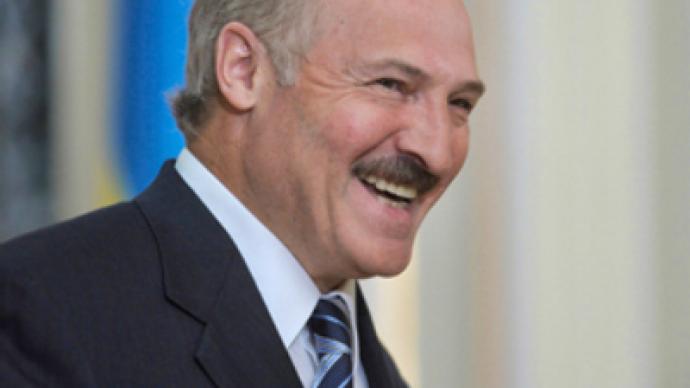
The Electoral Rating of Alyaksandr Lukashenka Is Up Again
Publication: Eurasia Daily Monitor Volume: 10 Issue: 182
By:

The new (September) national survey by the Independent Institute for Socio-Economic and Political Studies (IISEPS), a pollster sponsored by the West and headquartered in Vilnius, Lithuania, revealed that the electoral rating of President Alyaksandr Lukashenka has risen to 42.6 percent. This is the share of respondents who would be ready to vote for Lukashenka if the presidential elections were held “today.” In March 2013, 33.4 percent were willing to vote for him, and in June, 37.3 percent declared this intention—so there is a clear trend. Notably, in September 2011, that is, at the time of the acute financial crisis, Lukashenka’s electoral rating reached a historical minimum of 20.5 percent. The pollsters themselves suggest a careful interpretation, according to which the reasons behind a robust rise in Lukashenka’s rating “are versatile and cannot be reduced only to total control over society.” They suggest such reasons as Lukashenka’s dexterity in shifting the responsibility for failures to others and a lack of a convincing alternative to Lukashenka. Indeed, 81.5 percent of respondents cannot name anybody who could successfully compete with Lukashenka (https://iiseps.org/reliz/25).
More than anything else, however, the pollsters see the strongman tradition embedded in the political culture of Belarusians as the factor of Lukashenka’s electoral support. Indeed, 28.3 percent of respondents believe that “there are situations (like right now) when all power should be concentrated in the hands of one person.” And a further 26.1 percent believe that “our people need to be strong-armed constantly.” Many fewer people trust that a “concentration of power in the hands of one person should be avoided at any rate.” Besides a penchant for a strongman, it could be that Lukashenka’s personality itself is to the liking of many Belarusians. At the November 2012 meeting of the Association for the Advancement of Slavic, East European and Eurasian Studies, held in New Orleans, Louisiana, Stephen White from the University of Glasgow (Paper forthcoming), using a survey by a different pollster, reported that if the regularly revealed explanatory variables of Lukashenka’s support base, such as low education level, old age, and perception of government performance, are included alongside personal attitude to the Belarusian leader, the latter eclipses the impact of all other variables on Lukashenka’s electoral rating. In this regard, Lukashenka’s ability to verify the public’s attitude to his policies and then to publicly change his mind regarding the least popular measures is noteworthy. For example, when his idea to start charging shuttle traders a $100 fee for traveling to the West to buy consumer goods elicited mass disapproval (see EDM, September 19), Lukashenka said this this fee was only floated as a possible but unlikely counter-measure to large-scale hard currency outflows, which were supporting somebody else’s and not the domestic Belarusian economy (https://naviny.by/rubrics/society/2013/09/28/ic_articles_116_183153/).
The September electoral rating of opposition politician Uladzimer Neklyaev is 5.2 percent, and that of Andrei Sannikau is 3.1 percent. Both Neklayev and Sannikau were 2010 presidential hopefuls. Only 14.2 percent of Belarusians identify themselves as being opposed to the government in power. In December 2012, 21.3 percent self-identified that way, and in March, 16.9 percent did—so this is also a clear trend. Only 15.3 percent trust the opposition parties, whereas 62.8 percent distrust them. The pollsters admit that, just like in the case of the electoral support for Lukashenka, the lack of support for the opposition “cannot be attributed to just propaganda and fear.” Indeed only 24.4 percent of respondents believed that the opposition understands the problems and concerns of ordinary people (https://iiseps.org/reliz/25).
No significant changes occurred in the geopolitical orientation of Belarusians. Still, a “gravitation” toward Russia appears to be on the decline. If a referendum about the unification of Russia and Belarus were held “today,” 27.6 percent would vote in favor of unification, whereas 46.9 percent would vote against it. In June, the ratio was 31.2 percent to 46.5 percent, respectively. This, however, has not led to a strengthening of pro-European leanings. In response to a hypothetical referendum about joining the European Union, 37.8 percent would vote in favor and 37.5 percent against joining; in June, the ratio was 37.7 percent to 38.1 percent, respectively. If the choice were between the two alternatives—i.e., joining Russia or the EU—35.6 percent would opt for Russia and 42.4 percent would opt for the EU; this past June, the respective ratio was 40.8 percent to 41 percent. Despite a cooling of the Belarusians’ attitude to joining Russia, the majority assign positive marks to Belarus’s integration into the planned Eurasian Union (https://iiseps.org/reliz/25).
Along the lines of forging this union, two other observations command attention. First, in their Infofocus bulletin (No. 9, September 2013), the IISEPS pollsters acknowledge their mistaken prediction of Lukashenka’s defeat in the potash war with Russia. The way they explained their blunder is that they mistook the “ad hoc cluster of pro-power clans preoccupied with a permanent redistribution of assets” for the Russian state itself.
The second observation concerns Lukashenka’s October 3–4 visit to Kazakhstan. During their meeting, Lukashenka and Nursultan Nazarbaev spoke against the creation of a supra-national political body that would govern the Eurasian Union as well as against a common currency for the bloc (https://naviny.by/rubrics/politic/2013/10/03/ic_articles_112_183199/).
Also, in his interview to the Kazakh TV channel KZ 24, Lukashenka contributed yet again to his enfant terrible image with his supportive remarks on Vladimir Putin’s challenge to American exceptionalism in the Russian president’s New York Times article. Lukashenka’s specific wording was as follows: “The worst thing is when they [US authorities] start pounding the idea of how exceptional they are into the heads of their own population. And as it was once in Germany, they are beginning to understand that [Americans are] a special race, a special blood, and [they] have to establish some special order in the world and trim everybody to fit their standards. This is a very dangerous trend… Just recently, black people in America were slaves and today they claim exceptionalism. I never thought that a man [referring to President Barack Obama] that came out of these poor strata could pursue such rhetoric on the world scene” (https://naviny.by/rubrics/politic/2013/10/02/ic_articles_112_183193/).
In summary, Lukashenka remains a popular strongman—and one uniquely unconcerned with politesse. In a synergistic way, these two qualities may well feed into each other to help him maintain his power.




